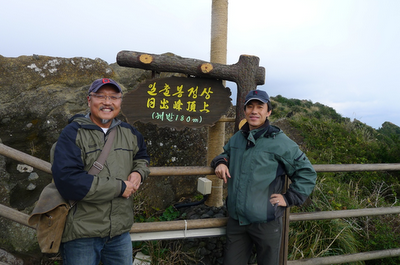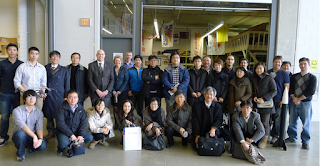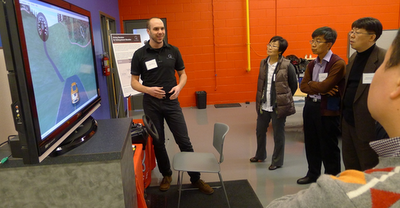No, this is not a commentary on the political situation in Korea, but an account of a series of events that transpired over a scant three months involving an intriguing combination of international meetings in China, Korea and Canada... yes, it still does sound like a political tale, doesn't it?
In October of 2011, Quanser CEO Paul Gilbert and I attended the Global Colloquium on Engineering Education in Shanghai. There, we, by chance, met with Professor Wonjong Joo of Seoul National University of Science and Technology (affectionately referred to as SeoulTech). Through various chats and coffee breaks, we discovered that he ws the director of a "Hub Center" in a national inititative called the Innovation Centers for Engineering Education (ICEE). This is a well-funded government initiative that identified 60 leading engineering universities in Korea and encouraged them to research and establish innovative practices to transform the engineering curriculum to better meet the needs of the roaring Korean industrial sector of the 21st century.
South Korea has earned the reputation of a "miracle" economy. Within a single generation, the nation innovated itself up from theashes of two brutal wars and foreign occupation. Since the 1960's when the basic infrasturcture stabilized, the average annual income climbed from $100 to the current $20,000 - from the extreme end of "third world" existence to one of the most respected and dynamic economies of today. To continue its progress, the country has concluded that it needed a community of modern engineers who not only escelled technically but were also innovative and global in their worldview. Indeed, mega-companies such as Samsung strongly expressed a desire to close the gap between the skill sets of engineering graduates with the needs of conttemporary Korean industry. ICEE was born out of these needs.
Side one of this tale was an invitation by Dr.Joo to me to speak at a conference of Korean engineering educators representing the network of ICEE institutions. This was held in early December of 2011 on the famous Jeju Island off the southern tip of Korea. This island has a very special place in the hearts of the people of the country. Volcanic in origin, it offers a startling comination of natural beauty and cultural uniqueness even within a larger context of the Korean nation which generally prides itself on its cutural uniqueness. In all, it was a very stimulating and collegial environment to engage in healthy discussions on pedagogy.
 |
| Professor Joo and I pose atop Seongsan volcanic peak, a landmark on Jeju Island |
What I learned from my new friends was enlightening and heartening. The discussion were dominated by ideas and case studies on increasing the relevance and experiential dimensions in modern engineering education. Hands-on, application-driven, collaborative, immersive and interactive were the kind of words that framed all of the discussions. for a country whose traditional education paradigms enforced intensive absorption oand uncompromising discipline, this was indeed refreshing. Over the years my own views on education have generally challenged the traditional linearity of the North American curriculum; certainly ths success of the Quanser business is founded on this modern perspective as well.
 |
| Leaving my mark on the rugged beaches of Jeju |
Side two of this tale occurs on the other side of the world. In addition to the generous invitation that I received to address the Korean conference, I also received a request from Professor Joo for help in facilitating a visit to Canada to learn more about how education innovation happens here. The fun part about this visit, as I quickly learned, was that the visit would not be one or two professors but a delegation of 23 people representing 11 institutions. Somehow we had to engineer an itinerary that combined visits to leading Canadian universities and industry... and this had to happen during a very short visit duration of two days. In the end we settled on a visit to York University, currently in the process of increasing its undergraduate engineering program from 500 to 2000 students; the University of Waterloo, arguably Canada's most successful engineering program; and a visit to our own headquarters to gain insight into progressive Canadian industry.
 |
| The delegation at the University of Waterloo's Student Design Center |
With both universities, we received a rich and engaging series of sessions covering a vast range of education topics with respectively unique views from the two institutions. Waterloo has a 60 year history of doing the unconventional. From building the world's largest co-op program, to introducing new interdisciplinary programs at a blistering pace, to methodically expanding its positive influence through community outreach programs, it has set the standard for academic engineering innovation. York, being the rising star within the Canadian engineering scene, draws from its global reputation as a center for fundamental sciences, humanities and business and has attempted to redefine what the modern engineer should be.
 |
| Quanser curriculum developer Peter Martin demonstrates a new application concept for control systems labs |
Yes, the modern engineer should be technically proficient, but she must also be interdisciplinary in thinking, entrepreneurial in ambition, creative in methodology, and global in attitude. At Quanser, the delegation had an opportunity to see and feel first hand some of the latest technology trends that, we believe, will transform the way universities deliver essential engineering experiences to students.
For me as a Korean-born Canadian, this was an amazing chance to experience the Korean academic community in the home country and in my adopted country. I felt privileged that the two sides of my heritage converged on the key context of education, a context that has been so important to me for many years. And in the end, I'm happy to report that, as the cliche goes, there seems to be more that draws us together than keeps us apart.
- Dr. Tom Lee
As Chief Education Officer at Quanser, Tom Lee is focused on spearheading the development of Quanser's global academic community. He is closely involved with Quanser's technology and solution development process and the company's partner and alliance programs. He holds a PhD in Mechanical Engineering, and an MASc and BASc in Systems Design Engineering from the University of Waterloo.


